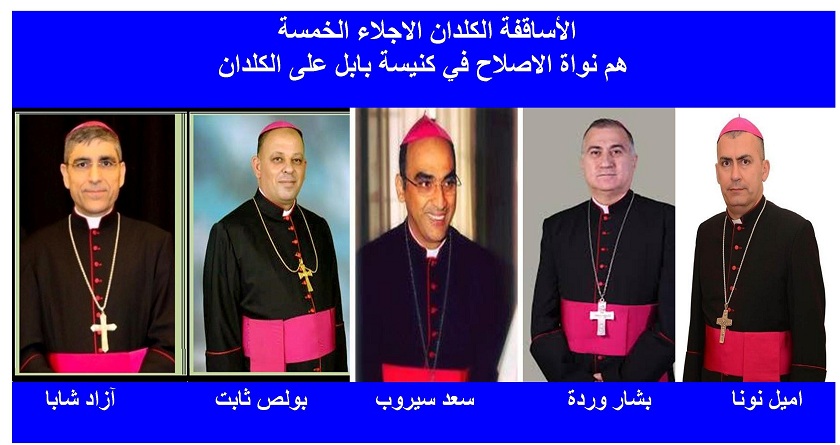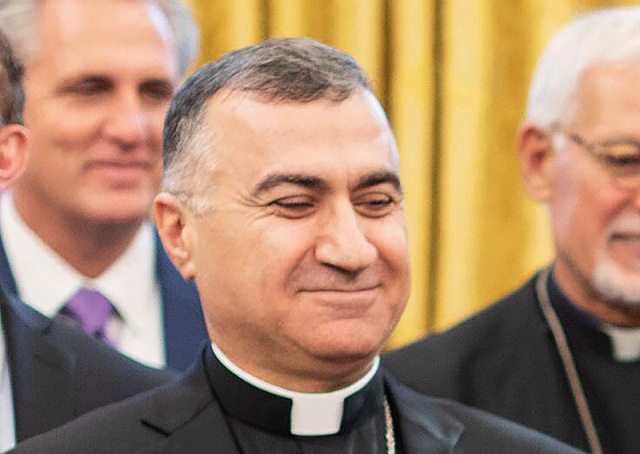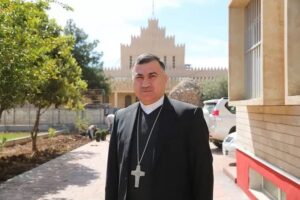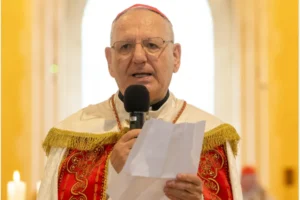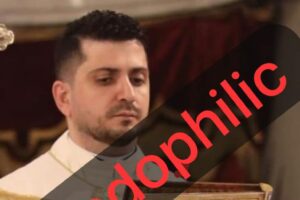by Patrick Hudson
A personal statement by Sako four days later accused the five bishops of complicity in the withdrawal of his decree.
Archbishop Bashar Warda
photo: alamy/2020 images
The Patriarch of Baghdad Cardinal Louis Raphaël Sako wrote to the Pope last week with a report on the conduct of Archbishop Bashar Warda of Erbil and four other bishops who did not attend the synod in Baghdad on 15-19 July.
Besides Warda, two of the absentees are based in Iraq: Bishop Paul Thabet of Alquoch and Bishop Azad Sabri Shaba of Dohuk, both ordained to their diocese in 2022. The others were the Chaldean Archbishop of Sydney Amel Shamon Nona and Bishop Saad Sirop Hanna, the apostolic visitor for Chaldean Catholics in Europe.
July’s synod was the first since the patriarch’s return to the capital after nine months’ self-imposed exile in Erbil, the capital of Iraq’s Kurdish region. He had moved the patriarchate there after President Abdul Latif Rashid withdrew presidential decree 147 recognising Sako’s status as head of the Chaldean Church and administrator of its endowments. Prime Minister Mohammed Shia’ al-Sudani issued another decree restoring his “institutional recognition” in June.
The five absent bishops allege canonical irregularities in Sako’s conduct, claiming the synod ought to have been held earlier in Erbil, or else in Rome. A communiqué from the 17 bishops who did attend the synod said their absence was “without legal justification”.
According to the statement published on 28 August, demanding an apology from the absent bishops, the synod had sent its own letter to them in July asking them to join the meeting as “the natural and legitimate place to address problems…[and] to continue strengthening the unity of the episcopal rank”.
They also warned that absence violated the first article of Canon 104, under which bishops “legitimately called to the synod of bishops…are bound by the serious obligation to attend that same synod” and those present authorised “to decide upon the legitimacy” of any reason for absence.
On 31 July, the General Secretary of the Chaldean synod, Archbishop Mirkis, sent a letter to the five absent bishops stating that “the bishops participating in the Synod on July 15-19, 2024 in Baghdad, appreciate the stance of Patriarch Sako, who supported the status, role and rights of the Church during the crisis of withdrawing Decree (147 of 2013)…and we thank His Beatitude for his wise and paternal care. The letter went on to say “The presence of the bishops in the Synod is an ecclesiastical and conscientious duty, where discussions are conducted in a fraternal spirit far from personal desires, as the Church has not and will not be a party, and is not loyal to individuals, regardless of their status and position, as the first and last reference is the person of Jesus Christ. Therefore, we call for respecting the position of the Patriarch as a father and head of his Church and respecting the decisions of the Synod.”
In the weeks after the synod, the priests of the dioceses of Erbil, Dohuk and Alquoch did not attend a Church-wide retreat for clergy, and the dioceses’ seminarians were withdrawn from the patriarchal seminary in Baghdad to be sent to study in Lebanon.
A statement published on the patriarchate website on 20 August called these measures “declared disobedience”, while a personal statement by Sako four days later accused the five bishops of complicity in the withdrawal of his decree and of conspiring “to thwart the synod”. He threatened “legal action” if they failed to “declare their obedience”.
The 28 August statement called their conduct a “dangerous precedent” and said their fellow bishops had demanded “appropriate legal measures for these clear violations”, citing various canons with a penalty of excommunication for disobedience. It demanded a formal apology by 5 September.
“Our bishops are asking me to finish this legally,” Sako told The Tablet on 10 September. He confirmed that the bishops had made no response by the deadline.
The patriarch said he was confident of the Pope’s support against the dissenting bishops and that “something will be taken against them”. He insisted he had fulfilled canonical requirements by consulting the Chaldean Church’s four-member permanent synod and issuing a warning to the bishops – by publishing the demand for an apology – as required under Canon 95, before deferring the matter to the Pope.
A statement on the patriarchate website on 7 September had referred to the bishops’ case going “to the highest ecclesiastical court”. Sako confirmed to The Tablet that he had sent it “directly to the Pope”, who, he said, has “supreme, full, immediate and universal ordinary power in the Church” (Canon 43).
Sako made a series of wider allegations against Archbishop Warda, who has won prominence in Europe and the US through his advocacy and voracious fundraising for projects in his diocese. Sako accused Warda of collaborating with Rayan al-Kildani, the leader of a nominally Christian militia, who is sanctioned by the USA for human rights violations and has made a series of public attacks on the patriarch. He said that Warda had “pushed me to give my resignation” after the withdrawal of decree 147 by President Rashid last year.
A statement issued to The Tablet on behalf of the Archdiocese of Erbil on 11 September rejected the “the inappropriate and unsubstantiated public allegations” against Warda and the other four bishops. It said it would “refrain from debating this matter in public” and had submitted its own report to the Vatican. “The archdiocese looks forward to a brotherly resolution of any differences between all involved through legitimate dialogue in a spirit of authentic synodality,” the statement said.
In his response, Sako said the place for “legitimate dialogue in a spirit of authentic synodality” is the Chaldean synod of bishops. He added, “By refusing to attend the synod, Archbishop Warda rejects legitimate dialogue.”
https://www.thetablet.co.uk/news/19336/baghdad-patriarch-reports-five-bishops-to-the-pope


